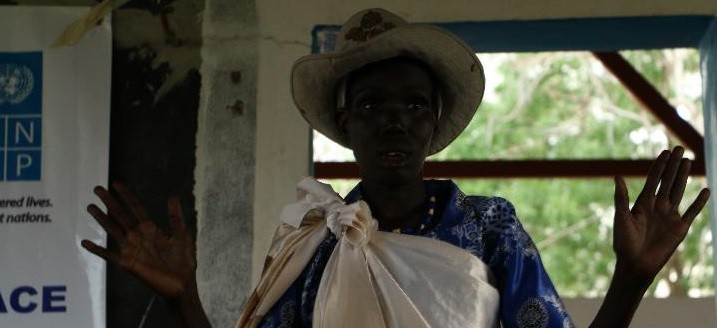Bentiu communities have demanded accountability for war crimes during a three days dialogue organised between 7 – 9 June 2016 by the Dialogue and Research Initiative (DRI).
The dialogue was attended by more than 72 participants (34 female, 38 male) ranging from women leaders, traditional authorities, representatives from the State Legislative Assembly, youth groups and the church.
The three-day dialogue was supported by UNDP’s Access to Justice and Rule of Law project in collaboration with the UNMISS Human Rights and UNMISS Civil Affairs Division.
Over the course of the three days, the participants discussed the meaning of transitional justice, the Chapter V institutions: the Hybrid Court for South Sudan (HCSS), the Commission for Truth, Reconciliation and Healing (CTRH), and the Compensation and Reparation Authority (CRA).
The role of traditional justice mechanisms in the peace process were also discussed. The participants spoke out strongly in favour of accountability and the Hybrid Court for South Sudan, which they considered as central to bringing an end to impunity and preventing future outbreaks of large-scale violence.
The participants also spoke about the need to forgive and discussed the challenge of how to reconcile with people that have been displaced to other parts of the country.
The participants strongly urged for the need for compensation and reparation for the wrongs done during the war
State Minister of Education, Science and Technology Dr. Chuot Yier Koryom, who spoke on behalf of the governor, expressed his commitment to promote peace and reconciliation. He urged the participants to disseminate what has been learned over the past three days to fellow citizens in the other counties.
The minister pointed out that Bentiu and surroundings areas were amongst the places most heavily affected by the December 2013 crisis and that “not only physical infrastructure was destroyed, but also the lives and minds of the people.” He urged all participants to “sit down and talk, to each other and find solutions, forgive and reconcile within their communities.”
The dialogue series organised by DRI is part of an larger awareness-raising and dialogue programme on transitional justice supported by UNDP South Sudan’s Access to Justice and Rule of Law project in collaboration with the UNMISS Human Rights Division.
The Dialogue and Research Initiative (DRI) is part of a network of CSOs known as the Transitional Justice Working Group (TJWG).
The TJWG aims to coordinate civil society organisations working on transitional justice in South Sudan so as to play a crucial role in representing citizens’ voices, act as a platform to support the peace agreement and provide interface between transitional justice stakeholders and the official transitional justice processes in South Sudan.
Photo: Leader of a women’s group demands accountability for human rights violations




